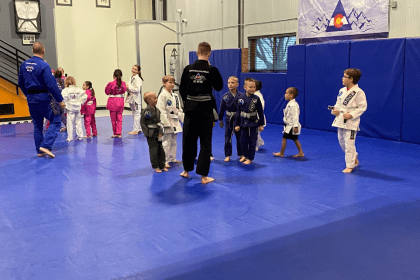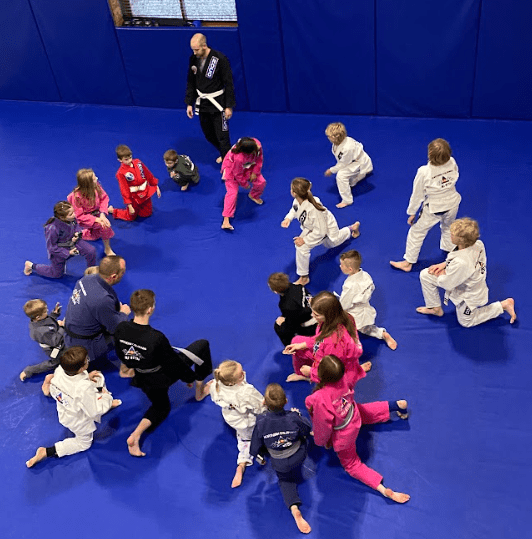
As parents, we are always looking for ways to help our children grow and develop the skills they need to navigate life’s challenges. One standout option is 5-year-olds jiu jitsu, a martial art that can foster physical, mental, and emotional growth in children as young as five. At NOCO Jiu Jitsu and Self Defense, our experienced instructors have designed programs specifically tailored to meet the needs of young children. We provide a safe and supportive environment for them to learn, grow, develop valuable skills, build confidence, and lay the foundation for a lifetime of personal growth and achievement. Additionally, we welcome 4-year-olds to enroll in our academy, ensuring even younger children can start their journey early. This comprehensive guide will explore the many benefits of jiu jitsu for young children, addressing common questions and concerns parents may have, from the ideal starting age and specific skills children can develop to safety measures and the long-term impact of jiu jitsu on a child’s future.
What Age Can You Start BJJ?

Many jiu jitsu schools welcome children as young as five years old to their programs. This early start can be crucial in helping children develop fundamental skills and behaviors. Schools often consider several developmental factors when accepting young children into their training programs. Physical coordination, emotional maturity, and the ability to follow basic instructions are essential.
Children who begin jiu jitsu at five can learn foundational movements and techniques, setting the stage for further development. This age also allows them to build discipline, patience, and self-confidence, which are invaluable as they grow older.
What Are the Benefits of Jiu Jitsu for Young Children?

Practicing jiu jitsu offers numerous benefits for young children that extend far beyond the physical aspects of the martial art. Engaging in regular jiu jitsu training can have a profound impact on a child’s overall development, nurturing their physical, mental, emotional, and social growth.
| Benefit Category | Specific Benefits |
| Physical Development | – Enhances coordination, agility, and strength
– Promotes a healthier and more active lifestyle |
| Mental Focus | – Builds concentration and problem-solving skills
– Improves academic and personal growth |
| Emotional Control | – Helps navigate challenges and manage frustrations
– Develops resilience and emotional intelligence |
| Social Skills | – Fosters healthy friendships and teamwork
– Encourages respectful interactions with peers |
By starting jiu jitsu training at a young age, children have the opportunity to develop these vital qualities as they grow and mature. The skills and values learned on the mat serve as a strong foundation that can positively influence various aspects of their lives, both in the present and in the future.
Is Jiu Jitsu Good for Little Girls?

Jiu jitsu is an excellent martial art for young girls, providing a wide range of benefits that contribute significantly to their personal growth and development. The structured training of jiu jitsu for 5-year-olds helps girls cultivate essential qualities and skills that will serve them well throughout their lives.
- Confidence: Training encourages girls to step out of their comfort zones and trust their abilities, leading to improved self-esteem.
- Strength: Physical conditioning and grappling techniques help them develop strength, ensuring they feel strong and capable.
- Respect: The respectful culture of jiu jitsu teaches girls to value themselves and others.
In the supportive environment of a jiu jitsu school, young girls can find a space that encourages them to challenge themselves, embrace their unique abilities, and strive for continuous improvement. By engaging in this empowering martial art, girls learn to stand up for themselves, build resilience, and navigate the challenges of growing up with greater confidence and self-assurance.
How Does NOCO Jiu Jitsu Ensure Safety for Young Children?

At NOCO Jiu Jitsu, the safety and well-being of young students is of utmost importance. The school has implemented a comprehensive set of measures to create a secure and nurturing training environment that allows children to learn and grow without undue risk of injury.
- Instructor Supervision: Experienced instructors carefully supervise all training sessions to prevent injuries and guide proper technique.
- Skill-Level Sparring: Students are paired based on size and skill level to promote safe, fair sparring.
- Protective Gear: Gears like mouthguards and head protection help minimize the risk of injury.
The experienced instructors at NOCO Jiu Jitsu are dedicated to maintaining a safe and controlled training environment. They closely monitor all activities, provide clear instructions, and ensure that students adhere to proper techniques and safety guidelines. By carefully supervising sparring sessions and pairing students based on size and skill level, the instructors minimize the risk of injury and promote fair, enjoyable training experiences for all participants. Additionally, the use of protective gear, such as mouthguards and head protection, further enhances safety by reducing the potential for impact-related injuries. Through these comprehensive safety protocols, NOCO Jiu Jitsu has created a secure learning environment that allows children to explore and enjoy their training without undue concern for their physical well-being.
NOCO Jiu Jitsu and Self Defense allow 4-year-olds to be enrolled in the academy. Some kids aren’t ready by then, but some do wonderfully! This inclusive approach ensures that children of various readiness levels can participate and benefit from the structured, supportive environment.
What Skills Do Children Develop Through Jiu Jitsu?

Jiu jitsu training offers children a unique opportunity to develop a wide array of valuable skills that extend beyond the physical techniques learned on the mat. Through consistent practice and dedication, children can cultivate important life skills that will serve them well in various aspects of their lives.
- Discipline: The structured training fosters a sense of discipline that translates to other areas of life.
- Problem-Solving: Students must quickly analyze their opponents’ movements and adapt, helping them develop effective problem-solving skills.
- Social Interaction: Training alongside peers fosters respect, teamwork, and healthy competition.
The disciplined nature of jiu jitsu helps children build a strong work ethic and set goals. They learn perseverance, consistency, and self-improvement while progressing through the ranks. On the mat, students analyze their opponents and develop strategies to overcome challenges, improving their critical thinking. Jiu jitsu also fosters camaraderie and teamwork, encouraging kids to support one another, communicate well, and compete healthily. These skills give children an advantage not just in jiu jitsu but also in school, sports, and relationships.
How Do Parents Choose the Right Jiu Jitsu School for Their Child?

Selecting the right jiu jitsu school for your child is a crucial decision that can greatly impact their overall experience and development in martial arts. As a parent, it is essential to carefully consider several key factors to ensure that the chosen school provides a safe, supportive, and nurturing environment that aligns with your child’s needs and goals.
- Instructor Experience: Look for qualified instructors experienced in working with children and fostering a supportive environment.
- Training Curriculum: Ensure the curriculum is suitable for your child’s age and developmental stage.
- Class Structure: Observe a class to see how instruction and supervision are handled.
- Student Feedback: Speak with other parents and students to understand the school’s atmosphere.
When evaluating potential jiu jitsu schools, consider the experience and qualifications of the instructors, especially those with a history of working with children. Ensure the curriculum is age-appropriate and supports your child’s development through a mix of techniques, challenges, and character-building exercises. Attend a class to observe the instruction and supervision firsthand, and speak with other parents and students for their insights on the school’s community and effectiveness. Taking these factors into account will help you choose a positive and nurturing environment for your child’s growth.
What Should You Expect From Your Child’s First Jiu Jitsu Class?

Your child’s first jiu jitsu class is an exciting and important milestone in their martial arts adventure. While the specific structure of the class may vary depending on the school and instructor, there are some common elements that you can expect your child to experience during their initial session.
- Warm-Up: A series of stretches and light exercises to prepare the body for training.
- Technique Practice: Learning fundamental movements and techniques suitable for beginners.
- Sparring (if applicable): Supervised sparring with other students of similar age and skill level.
The class will likely begin with a warm-up session, which typically includes a series of stretches and light exercises designed to prepare your child’s body for the physical demands of training. This portion of the class helps prevent injuries and ensures that your child is ready to engage in the upcoming activities. Following the warm-up, the instructor will introduce your child to the fundamental movements and techniques of jiu jitsu. These basic techniques are carefully selected to be appropriate for beginners and will serve as the foundation for your child’s future growth in martial arts.
The instructor will guide your child through each technique step-by-step, providing clear explanations and demonstrations to ensure that they understand and can execute the movements correctly. If the school includes sparring in their beginner classes, your child may have the opportunity to engage in supervised sparring with other students of similar age and skill level. During these sparring sessions, the instructors will closely monitor the interactions and provide guidance to ensure the safety and well-being of all participants. They will also introduce new students to basic safety rules and etiquette to help them navigate the sparring experience with confidence and respect. Throughout the class, the instructors will create a supportive and nurturing environment, encouraging your child to ask questions, express concerns, and celebrate their achievements. By the end of their first jiu jitsu class, your child will have taken their first steps on a profound path of personal growth and development.
How Can Jiu Jitsu Impact a Child’s Future?

The practice of jiu jitsu can have a profound and lasting impact on a child’s future, extending well beyond the physical techniques learned on the mat. By engaging in consistent training, children develop a wide range of skills and values that can shape their character and influence their success in various aspects of life.
- Work Ethic: The discipline required helps them maintain a strong work ethic in academics and later, in their careers.
- Conflict Resolution: Managing sparring situations teaches children how to handle conflicts calmly and thoughtfully.
- Lifelong Fitness: The emphasis on physical conditioning and healthy habits encourages lifelong fitness.
Jiu jitsu helps children develop a strong work ethic through consistent discipline and dedication. This ethic translates to academics and later to their careers, fostering perseverance and goal-setting. The martial arts also teach conflict resolution, as sparring requires students to handle challenges thoughtfully and respectfully. Jiu jitsu emphasizes physical conditioning, promoting strength, endurance, and healthy habits like balanced nutrition and self-care. The resilience, social skills, and values learned equip children to handle future challenges and opportunities, making jiu jitsu a life-changing experience with lasting impacts.
Why Should You Consider NOCO Jiu Jitsu for Your Child?

NOCO Jiu Jitsu has designed its programs specifically to help young children thrive. With experienced instructors, a nurturing environment, and a comprehensive curriculum, your child will receive the attention they need to excel. At NOCO Jiu Jitsu and Self Defense, we allow 4-year-olds to come to try classes, giving even the youngest children the opportunity to start their martial arts journey. Ready to take the next step? Enroll your child at NOCO Jiu Jitsu and Self Defense and let them discover the world of jiu jitsu.
Jiu jitsu offers a wealth of benefits for young children, particularly those as young as five. We believe that martial arts training is an empowering tool for children’s growth and development, and NOCO Jiu Jitsu and Self Defense is committed to providing a safe, supportive space for them to thrive. Explore the world of jiu jitsu with us and see how it can make a difference in your child’s life.
Frequently Asked Questions:
- What age can you start Brazilian Jiu Jitsu (BJJ)?
Many jiu jitsu schools welcome children as young as 5 years old into their programs. This early start allows children to develop fundamental skills, discipline, patience, and self-confidence from a young age. NOCO Jiu Jitsu and Self Defense allows 4-year-olds to be enrolled in the academy. Some kids aren’t ready by then, but there are some who do wonderfully!
- Is jiu jitsu good for little girls?
Yes, jiu jitsu is an excellent martial art for young girls. It helps cultivate confidence, strength, and respect for themselves and others. The supportive environment encourages girls to challenge themselves and embrace their unique abilities.
- How does NOCO Jiu Jitsu ensure safety for young children?
NOCO Jiu Jitsu implements several safety measures, including instructor supervision, skill-level sparring, and the use of protective gear like mouthguards and head protection. This helps create a secure and nurturing training environment for children.
- What skills do children develop through jiu jitsu?
Jiu jitsu training helps children develop various valuable skills, such as discipline, problem-solving, social interaction, critical thinking, teamwork, and communication skills. These skills benefit them in various aspects of life, not just martial arts.
- What should parents expect from their child’s first jiu jitsu class?
In the first class, children typically go through a warm-up session, learn fundamental movements and techniques suitable for beginners, and may engage in supervised sparring with other students of similar age and skill level. The instructors create a supportive environment and ensure safety throughout the class.




